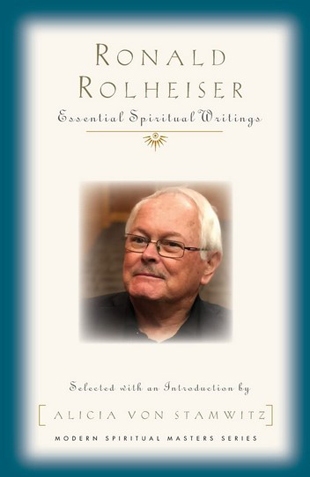There are some spiritual writers who have for decades appealed not only to a wide spectrum of progressive values but beyond that to a reimagination of the meaning of life itself. Serendipitously, three of the most enduring of these writers from the Catholic tradition stand together alliteratively and alphabetically in our Living Spiritual Teacher Project as Rohr, Rolheiser, and Rupp.
This retrospective volume of essential spiritual writings takes a long look at the middle teacher on that list: Ronald Rolheiser, a Catholic priest and theologian, one of the most popular and influential writers of any tradition over the last forty years.
There are well-chosen excerpts here from Rolheiser’s bestselling book, The Holy Longing, which we honored as one of the Best Spiritual Books of 1999; also from another of his most popular works, Sacred Fire, which we awarded similarly in 2014. But perhaps most important are the many selections from his syndicated column of several decades called “In Exile,” which has been the source of his greatest influence.
Rolheiser’s spirituality is born in the messiness of human life. Why is prayer difficult? Because we have to do it in the midst of life’s many challenges. Why is it hard to pay attention to what might have eternal significance? Because pain and suffering and just plain inconvenience captures our attention most days.
What is spirituality? His answer is “the fire within,” and then he defines that fire: “Spirituality is not something on the fringes, an option for those with a particular bent. None of us has a choice. Everyone has to have a spirituality and everyone does have one, either a life-giving one or a destructive one. No one has the luxury of choosing here because all of us are precisely fired into life with a certain madness that comes from the gods and we have to do something with that.”
Sexuality is part of that sacred fire, as an essential part of human life. Even though it’s unusual for a celibate priest to speak eloquently about this ubiquity, Rolheiser does compellingly and helpfully.
Restlessness, similarly. Rolheiser teaches us about desire, struggle, and loneliness. As usual, his teaching turns practical quickly, as when he offers suggestions to turn restlessness into a more restful and productive solitude: “Own your pain and incompleteness,” “Give up false messianic expectations,” “Go inward,” and acknowledge that this “is not something that is ever accomplished once and for all.”
Aging and dying also receive a lot of attention here, as do faith and doubt, justice and charity, and the passion and the cross of Christ, which Rolheiser describes as “the deepest word that can ever be spoken about love” with “multifarious levels of meaning.”
